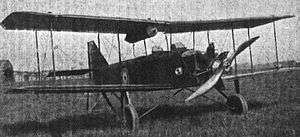BAT Baboon
The BAT F.K.24 Baboon was a British two-seat training biplane produced by British Aerial Transport Company Limited of London during World War I.
| F.K.24 Baboon | |
|---|---|
 | |
| Role | Two-seat Trainer |
| Manufacturer | British Aerial Transport Company Limited |
| Designer | Frederick Koolhoven and Robert Noorduyn |
| First flight | 1918 |
| Number built | 1 |
Design and development
Using experience gained designing the Bantam, aircraft designer Frederick Koolhoven (assisted by Robert Noorduyn) designed an elementary trainer, a two-bay biplane known as the F.K.24 Baboon.
The aircraft had a flat-sided fuselage and an uncowled 170 hp (127 kW) ABC Wasp engine. Six aircraft were planned but only one was built in July 1918.
The only notable act was when it won the Hendon Trophy Race over a 20-mile (32-km) circuit in July 1919 flown by Christopher Draper.[1] The Baboon was scrapped in 1920.
Specifications (F.K.24 Baboon)
Data from British Aeroplanes 1914-18 [2][3]
General characteristics
- Crew: 2
- Capacity: 400 lb (181.44 kg) disposable load
- Length: 22 ft 8 in (6.91 m)
- Wingspan: 25 ft (7.6 m)
- Height: 8 ft 10 in (2.69 m)
- Wing area: 259 sq ft (24.1 m2)
- Empty weight: 950 lb (431 kg)
- Gross weight: 1,350 lb (612 kg)
- Fuel capacity: 12 imp gal (54.55 l; 14.41 US gal)
- Powerplant: 1 × ABC Wasp I 7-cyl. air-cooled radial piston engine, 170 hp (130 kW)
- Propellers: 2-bladed BAT tractor, 5 ft (1.52 m), 7 ft 10 in (2.39 m) diameter
Performance
- Maximum speed: 90 mph (140 km/h, 78 kn)
- Landing speed: 40 mph (64 km/h; 35 kn)
- Endurance: 2 hours
- Rate of climb: 833.33 ft/min (4.2333 m/s)
- Time to altitude: 10,000 ft (3,048.0 m) in 12 minutes
- Wing loading: 5.2 lb/sq ft (25 kg/m2)
- Power/mass: 0.126 hp/lb (0.206 kW/kg)
gollark: I find most modern phones to be unreasonably large for me, since I want to actually hold them in one hand.
gollark: Probably increasing.
gollark: Or increasing it or whatever, I forgot.
gollark: I like reducing the DPI so I can fit more on the screen.
gollark: Can you not just adjust the font size in settings?
Notes
- Flight 31 July 1919, pp.1021-1022.
- Bruce 1957, p.75.
- Grey, C.G. (1969). Jane's All the World's Aircraft 1919 (Facsimile ed.). David & Charles (Publishing) Limited. pp. 84a to 85a. ISBN 978-0-7153-4647-1.
References
- Grey, C.G. (1969). Jane's All the World's Aircraft 1919 (Facsimile ed.). David & Charles (Publishing) Limited. pp. 84a to 85a. ISBN 978-0-7153-4647-1.
- The Illustrated Encyclopedia of Aircraft (Part Work 1982-1985). Orbis Publishing.
- "Flying at Hendon". Flight. No. 31 July 1919. pp. 1021–1022.
- "Some "BAT" Aeroplanes". Flight. No. 1 January 1920. pp. 18–19.
- Bruce, J.M. (1957). British Aeroplanes 1914-18. London: Putnam.
- Jackson, A.J. (1974). British Civil Aircraft since 1919 Volume 1. London: Putnam. ISBN 0-370-10006-9.
This article is issued from Wikipedia. The text is licensed under Creative Commons - Attribution - Sharealike. Additional terms may apply for the media files.